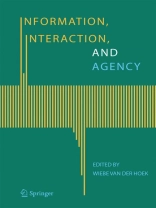Contemporary epistemological and cognitive studies, as well as recent trends in computer science and game theory have revealed an increasingly important and intimate relationship between Information, Interaction, and Agency.
Agents perform actions based on the available information and in the presence of other interacting agents. From this perspective Information, Interaction, and Agency neatly ties together classical themes like rationality, decision-making and belief revision with games, strategies and learning in a multi-agent setting.
Unified by the central notions Information, Interaction, and Agency, the essays in this volume provide refreshing methodological perspectives on belief revision, dynamic epistemic logic, von Neumann games, and evolutionary game theory; all of which in turn are central approaches to understanding our own rationality and that of other agents.
Table of Content
Logics for Epistemic Programs.- A Counterexample to Six Fundamental Principles of Belief Formation.- Comparing Semantics of Logics for Multi-Agent Systems.- A Characterization of Von Neumann Games in Terms of Memory.- An Evolutionary Game Theoretic Perspective on Learning in Mult-Agent Systems.- Evolution of Conventional Meaning and Conversational Principles.- Nonmonotonic Inferences and Neural Networks.- A Model of Jury Decisions Where All Jurors Have the Same Evidence.- A Sat-Based Approach to Unbounded Model Checking for Alternating-Time Temporal Epistemic Logic.- Update Semantics of Security Protocols.












